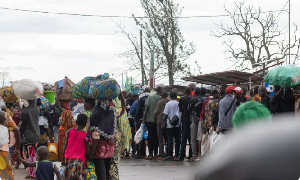Municipal and District Assemblies in the Brong-Ahafo Region have taken delivery of computers and accessories for data management to achieve provision of quality community water.
The equipment, comprising 40 desktop computers, nine laptops, 36 UPS, 27 LaserJet printers, 11 photocopy machines and 11 scanners, were distributed to the 27 assemblies of eight municipalities and 19 districts by the Regional Office of the Community Water and Sanitation Agency (CWSA) on Friday.
The cost was not disclosed but they were procured under the funding of International Development Association (IDA) of the World Bank community water and sanitation project with the CWSA and the assemblies.
This is a follow-up to an earlier presentation of similar items including 11 Nissan Pick-up vehicles and motor-bikes distributed to the assemblies in 2013 in Sunyani.
The assemblies are to use them to monitor the use and effective management of the community water and sanitation system, collect necessary data for storage, processing and reporting purposes in the region.
The Regional Coordinating Council also benefited from the package to enable it to aggregate all the information from the assemblies.
Mr. Eric Opoku, Brong-Ahafo Regional Minister, charged the Municipal and District Chief Executives (MDCEs) and the management of the assemblies to use the equipment for their intended purposes for the realization of government’s objective to provide potable water for everyone in the country.
Mr. Opoku said the assemblies were, therefore, not only obliged to be effective and efficient in the implementation of projects under the water sector but must also foster closer collaboration with the CWSA to deliver best rural water provision services to the people.
He said availability of potable water was a guarantee for the people to enjoy quality health because diseases caused by unwholesome drinking water would be absent and that would result in reduction of pressure on the National Health Insurance Authority to disburse funds to health service providers.
He reiterated government’s decision to drill 20,000 boreholes in the country, saying that project could effectively be implemented if there was availability of accurate and reliable data for the water sector.
Mr. Stephen Opoku Tufuor, Regional Director of CWSA, said the equipment would enable the assemblies to know at any time the necessary information about the community water system to aid planning and implementation.
He said the long-term objective was to give all the assemblies equal amounts of equipment and facilities for the data collection, collation, storage, processing for reporting and accountability purposes to achieve value for money in the community water and sanitation sector.
He, therefore, gave the assurance that those assemblies that had not yet received their vehicles and other facilities under the project would receive theirs accordingly.
Mr. Frank Tsidzi, Information Technology Specialist of CWSA in Sunyani, said the Agency’s community survey exercise had indicated the region had 2,798 boreholes and that CWSA had five districts to cover to complete coverage of the entire region with the provision of borehole water systems.
Regional News of Sunday, 2 November 2014
Source: GNA












